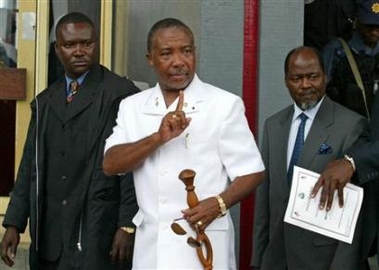Newsmaker
Charles Taylor: I promise to return
(AP)
Updated: 2006-03-30 10:54
 |
Large Medium Small |
Liberia's former president, , whose name became synonymous with child soldiers and brutal civil war in West Africa, vowed when he left for exile three years ago: "God willing, I will be back."
 Liberia's former President Charles Taylor (C) prepares to board a Nigerian aircraft to leave Liberia for exile in Nigeria in this August 11, 2003 file photo. Arrested on arrival at Monrovia airport, Taylor was flown by helicopter to a court cell in Sierra Leone to face war crime charges. [Reuters] |
But the charismatic former warlord's return on Wednesday to his war-scarred homeland was brief.
Arrested on arrival at Monrovia airport, Taylor was flown by helicopter to a court cell in Sierra Leone to face war crime charges.
He was arrested while traveling in a jeep with a trunk full of money after two nights on the run since fleeing exile in a luxury villa in Nigeria, sending shockwaves across a region where many people believed Taylor too powerful to stand trial.
Descended from the freed American slaves who founded Liberia in the 19th century, Taylor went from humble beginnings as the son of teacher to become Africa's most wanted war criminal.
Known simply as "Pappy" to a generation of child soldiers, Taylor styled himself as the savior of Africa's oldest republic despite 14 years of civil war which killed some 250,000 of his countrymen.
Famed for his charisma, 58-year-old Taylor led prayer meetings during his presidency dressed in white from head to toe, using them to publicly deny U.N. allegations of arms trafficking and diamond smuggling.
"History will be kind to me!" Taylor boasted at his resignation ceremony in 2003, using a favorite rhetorical device comparing himself to Jesus Christ.
Imprisoned on Wednesday in a cell behind the barbed wire and watchtowers of a U.N.-backed court, Taylor has previously blamed his downfall on the international community's "racist" attempts to humble Africa's leaders.
Taylor's rise began with a senior job under Liberia's first military dictator, Samuel Doe, but he was forced to flee to the United States in 1983 accused of embezzling almost $1 million.
Arrested in Massachusetts, Taylor reportedly escaped after just over a year by cutting the bars on the cell window with a hacksaw and scaling the wall using a knotted sheet.
He made his way to Libya, to train alongside other African dissidents in Muammar Gaddafi's combat camps, where he met the leader of a subsequent rebel movement in Sierra Leone.
In 1989, Taylor launched a rebellion from neighboring Ivory Coast to overthrow Doe, who was killed a year later by a rival warlord.
The revolt descended into a 14-year conflict during which Taylor is accused by the U.N.-backed special war crimes court in Sierra Leone of arming rebels during that country's civil war in return for diamonds.
Taylor won the 1997 elections by a landslide amid fears of a return to conflict.
Two years later, the Liberians United for Reconciliation (LURD) group launched a rebellion against Taylor in northern Liberia and by 2003 they laid siege to Monrovia. With many Liberians looking to the United States as a spiritual homeland, President George W. Bush sent warships to the Gulf of Guinea and demanded Taylor relinquish power.
By exerting a tight control over Liberia's diamonds, iron ore and rubber, Taylor amassed a multi-million dollar fortune.
Behind the high walls of his sprawling mansion on a hillside outside Monrovia, Taylor indulged his passion for tennis on a private court.
Taylor's business associates have included U.S. TV evangelist Pat Robertson, who held a gold mining concession in Liberia.
A report from the Sierra Leone special court's prosecutor has also accused Taylor, a Baptist lay preacher, of having sheltered members of al Qaeda sought in connection with 1998 bombings of U.S. embassies in Kenya and Tanzania.